Mali : Liberté de la presse ménacée
Le Mali est passé pendant longtemps pour un modèle de démocratie et de liberté de la presse en Afrique de l’Ouest. Les populations avaient à leur disposition près de 40 journaux et plus de 150 stations de radio comme sources d’information. Mais depuis le coup d’Etat en mars dernier et l’occupation du Nord par les islamistes, les entraves à la liberté d’information sont fréquentes aussi bien au sud qu’au Nord du pays.
![]() read more
read more
La liberté de presse au Tchad : sous pression ?
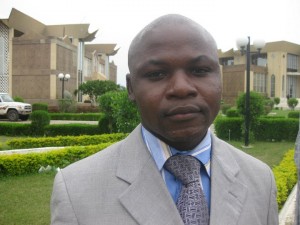 Le Tchad marque t-il le pas dans le respect de la liberté de presse ? Depuis quelques temps plusieurs journalistes tchadiens font l’objet de menaces et de sanctions de la part de NDjamena. Parmi eux, Eric Topona, journaliste à la radiotélévision publique et président de l’Union des journalistes du Tchad. L’ancien stagiaire de la Deutsche Welle, dit ne plus se sentir en sécurité dans son pays.
Le Tchad marque t-il le pas dans le respect de la liberté de presse ? Depuis quelques temps plusieurs journalistes tchadiens font l’objet de menaces et de sanctions de la part de NDjamena. Parmi eux, Eric Topona, journaliste à la radiotélévision publique et président de l’Union des journalistes du Tchad. L’ancien stagiaire de la Deutsche Welle, dit ne plus se sentir en sécurité dans son pays.
![]() read more
read more
Pas facile d’être journaliste au Togo !
Il était venu couvrir une manifestation pacifique du collectif “Sauvons le Togo”, à l’occasion du 52e anniversaire de l’indépendance de son pays. Mais le 27 avril dernier, Noël Kokou Tadegnon n’a pas été en mesure d’exercer son métier de correspondant de la Deutsche Welle et de Reuters : il a été assommé par un coup à la nuque. Il s’explique sur les conditions de cette agression et sur l’état de la liberté de la presse au Togo.
![]() read more
read more
“Nous avons un manque de formation pour les médias au Mali”
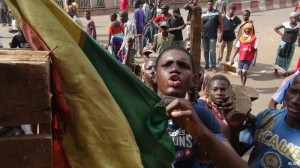 Depuis mi-janvier, le Nord du Mali est confronté à la reprise violente de la rébellion Touareg. Des milliers de personnes continuent de fuir les villes les plus touchées par les combats et les exécutions sommaires. Le MNLA, le groupe rebelle qui revendique l’indépendance de l’Asawad, est qualifié par Bamako de bandits armés sans foi ni loi. Ce groupe est composé d’anciens combattants Touaregs de l’armée libyenne.
Depuis mi-janvier, le Nord du Mali est confronté à la reprise violente de la rébellion Touareg. Des milliers de personnes continuent de fuir les villes les plus touchées par les combats et les exécutions sommaires. Le MNLA, le groupe rebelle qui revendique l’indépendance de l’Asawad, est qualifié par Bamako de bandits armés sans foi ni loi. Ce groupe est composé d’anciens combattants Touaregs de l’armée libyenne.
![]() read more
read more
Les médias sénégalais dans la tourmente de la présidentielle
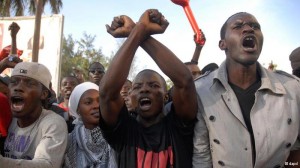 Au Sénégal, à seulement quelques jours de la présidentielle du 26 février prochain, la campagne électorale reste marquée par un climat très tendu entre pouvoir et opposition. Fin janvier, au moins quatre personnes ont trouvé la mort lors des manifestations organisées par les forces vives – partis politiques et société civile – qui protestaient contre la validation de la candidature d’Abdoulaye Wade par le Conseil constitutionnel. Au pouvoir depuis 2000, le président sortant brigue un troisième mandat à la tête du Sénégal. Des centaines de manifestants mobilisés par l’opposition contre ce troisième mandat sont presque constamment dispersés à coup de grenade lacrymogène par la police dans la capitale sénégalaise. Dans ces conditions comment les journalistes qui couvrent ces événements peuvent–ils exercer librement leur métier en cette période très mouvementée?
Au Sénégal, à seulement quelques jours de la présidentielle du 26 février prochain, la campagne électorale reste marquée par un climat très tendu entre pouvoir et opposition. Fin janvier, au moins quatre personnes ont trouvé la mort lors des manifestations organisées par les forces vives – partis politiques et société civile – qui protestaient contre la validation de la candidature d’Abdoulaye Wade par le Conseil constitutionnel. Au pouvoir depuis 2000, le président sortant brigue un troisième mandat à la tête du Sénégal. Des centaines de manifestants mobilisés par l’opposition contre ce troisième mandat sont presque constamment dispersés à coup de grenade lacrymogène par la police dans la capitale sénégalaise. Dans ces conditions comment les journalistes qui couvrent ces événements peuvent–ils exercer librement leur métier en cette période très mouvementée?
![]() read more
read more
Is Guinea really turning the page for press freedom?
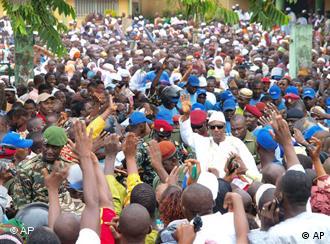
Can Alpha Condé live up to the high expectations?
Sekou Touré, Lansana Conté, Dadis Camara – Guinea has seen only three presidents in more than 50 years of independence. None of them has governed the country in a democratic way. Moreover, freedom of the press is still far from reality for the country’s journalists.
In 2010, Guinea finally went through democratic elections. So, what’s the state of press freedom in the country’s new democratic era?
Reporters without Borders looked at the current media situation in Guinea as well as in Niger – another country undergoing a transition. Turning the page is the optimistic title of their report, but the media watch dog organization has also labelled press restrictions issued by authorities on July 26 as censorship. Following an attempted attack on Guinea’s President Alpha Condé, the National Communication Council, banned all media from mentioning the attack. 72 hours later it lifted the ban.
![]() read more
read more
Est-ce que la Guinée tourne une page pour la liberté de la presse?
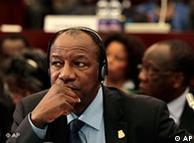
Le président Alpha Condé
La levée de ces restrictions est-elle une victoire pour la liberté de la presse en Guinée? Ecoutez la réponse d’Ambroise Pierre.
Interview: Bob Barry
Will independence improve press freedom in South Sudan?
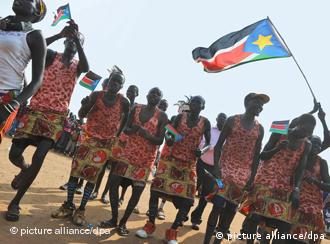 South Sudan is set to declare its independence from Khartoum on July 9, 2011.
South Sudan is set to declare its independence from Khartoum on July 9, 2011.
The citizens of the world’s newest nation have enormously high hopes for the future of their country. On July 9 a new anthem will be sung and a new flag will be raised, but essentially the country is starting from scratch.
Peace and security remain fragile and the international community will have to ensure that South Sudan does not become another failed state.
Against this background, will press freedom and conditions for journalists in a new South Sudan improve? Last year Sudan was again ranked as one of the worst countries in the Reporters Without Borders Press Freedom Index.
Press freedom in South Sudan was one of the major topics debated at the recent Deutsche Welle Global Media Forum. Here are few interesting points that emerged:
- Josephine Achiro, Programs Manager of Radio Bakhita, one of the most widely listened to radio stations in South Sudan said journalists are facing a lot of harrassment from security services and politicians. She also drew attention to the fact that international journalists have significantly more press freedom and access to politicians in South Sudan than local journalists.
- Kerstin Müller, Member of the German Parliament and Deputy Chairwoman of the Subcommittee for Civilian Crisis Prevention, said South Sudan first needs to build the structures that are needed for a democratic society and the international community needs to insist on a free media. Müller added that the Government of South Sudan needs to deliver on its promises.
- Manuela Römer, Media Trainer und Project Manager for South Sudan for the DW-Akademie, stressed that the media in South Sudan is perceived very negatively by authorities. Free media is “feared” and is seen as something which needs to be controlled. Römer pointed to the importance of engaging in a real dialogue on the role of the media – both with journalists and state officials. The DW-Akademie is therefore not only training journalists but also various other stakeholders, including officials in South Sudan’s Ministry of Information.
You can listen below to the full session and read more on this topic from DW’s Chiponda Chimbelu.
W21 – Promoting press freedom in Africa’s newest country – South Sudan by dwgmf
Reporting the mutinies and civil unrest in Burkina Faso
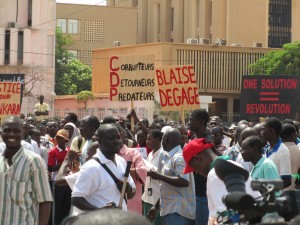 Journalists in Burkina Faso have faced difficult, dangerous and unpredictable conditions this year covering military mutinies, looting as well as civil unrest. The country has been gripped by a series of crises for several months. At least seven people including a young girl were killed when pro-government forces of President Blaise Compaoré quashed a mutiny in Bobo Dioulasso over May and June. This followed an earlier mutiny of soldiers in April. As a result of this violence, President Compaoré sacked top leaders of the military as well as his prime minister. The mutinies were preceded by violent student demonstrations in February. The protestors demanded justice after the killing of a university student in Koudougou, in the central-west of the country. Five police officers were charged with beating the student to death.
Journalists in Burkina Faso have faced difficult, dangerous and unpredictable conditions this year covering military mutinies, looting as well as civil unrest. The country has been gripped by a series of crises for several months. At least seven people including a young girl were killed when pro-government forces of President Blaise Compaoré quashed a mutiny in Bobo Dioulasso over May and June. This followed an earlier mutiny of soldiers in April. As a result of this violence, President Compaoré sacked top leaders of the military as well as his prime minister. The mutinies were preceded by violent student demonstrations in February. The protestors demanded justice after the killing of a university student in Koudougou, in the central-west of the country. Five police officers were charged with beating the student to death.
![]() read more
read more
Blocking Internet Access = Human Right Violation?
Against a background of the Arab Spring, a number of talks at the recent DW Global Media Forum focused on the importance of the Internet and social media networks during protests and popular uprisings, especially in Tunisia and Egypt.
But in their efforts to control information or suppress freedom of expression, some governments will try to block access to the Internet and mobile phone networks.
The United Nations has just issued a report saying that blocking Internet access may be a violation of human rights because it infringes on the freedom of expression.
This point was emphasised by Thorbjørn Jagland, Secretary General of the Council of Europe, during his keynote speech at the GMF.
“The Internet has become a space representing an unprecedented potential for freedom. Not only for the freedom of expression. It is now the main vehicle for democracy where people organise themselves and voice their opposition to government.”
Jagland added:
“We need a global instrument for this purpose, and I support the recent UN report’s call for access to the Internet as a globally recognised human right. I agree and we should start in Europe!”
So should access to the Internet be a human right? The DW-Akademie put that question to participants at the GMF.
Internet Access as a Human Right – GMF Vox Pop from DW Akademie – Africa on Vimeo
Photo credit: Deutsche Welle/K. Danetzki (some rights reserved 
 CC BY-NC)
CC BY-NC)
Video interviews: Chiponda Chimbelu



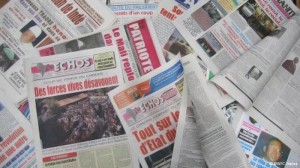

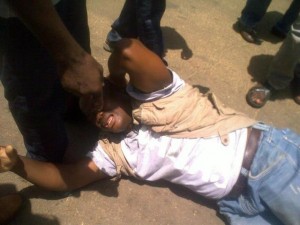
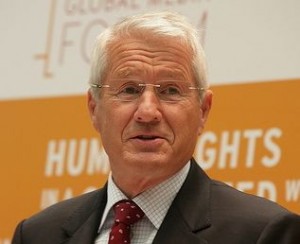




Feedback